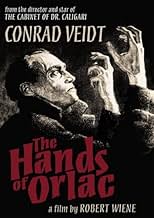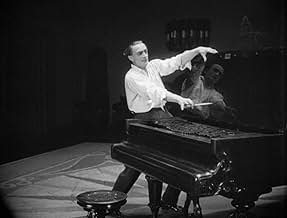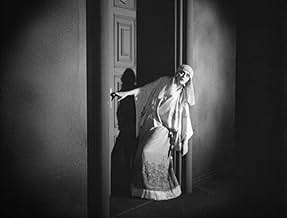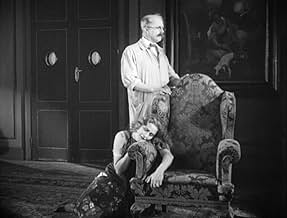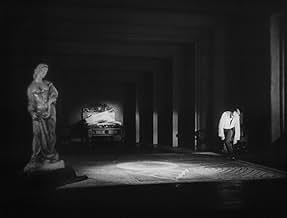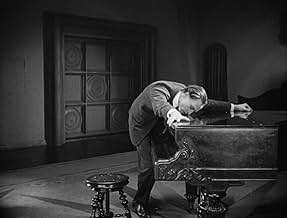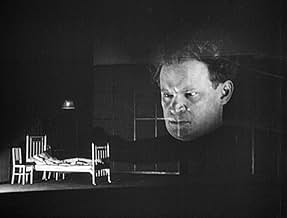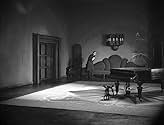IMDb रेटिंग
7.0/10
3.7 हज़ार
आपकी रेटिंग
अपनी भाषा में प्लॉट जोड़ेंA world-famous pianist loses both hands in an accident. When new hands are grafted on, he doesn't know they once belonged to a murderer.A world-famous pianist loses both hands in an accident. When new hands are grafted on, he doesn't know they once belonged to a murderer.A world-famous pianist loses both hands in an accident. When new hands are grafted on, he doesn't know they once belonged to a murderer.
Conrad Veidt
- Paul Orlac
- (as Veidt)
Alexandra Sorina
- Yvonne Orlac
- (as Sorina)
Fritz Strassny
- Der alte Orlac
- (as Strassny)
Paul Askonas
- Der Diener
- (as Askonas)
Carmen Cartellieri
- Regine
- (as Cartellieri)
Hans Homma
- Dr. Serral
- (as Homma)
Fritz Kortner
- Nera
- (as Kortner)
फ़ीचर्ड समीक्षाएं
I'm glad I had this chance to check out yet another German Expressionist classic even if I had to make do with faint Spanish subtitles over the original German intertitles (then again, the narrative is easy enough to follow)! It took me some time to warm up to the film: the pace is extremely sluggish (the aftermath of the train-wreck at the beginning seemed interminable), while the all-important decision to exchange the damaged hands of famed concert pianist Orlac with those of a murderer felt too abrupt.
In preparation for this review, I re-read Michael Elliott's comments on the film: while I generally concur with his opinion, at this stage I wouldn't put this above the 1935 Karl Freund/Peter Lorre/Colin Clive remake MAD LOVE (Ted Healy's intrusive comedy relief, to me, is just about the only negative element in that film while adding Dr. Gogol's obsessive yearning for Orlac's wife, hence the new title). Still, I was surprised by how much the later film actually followed the Silent version especially the two scenes in which Orlac meets the 'executed' murderer of the Maurice Renard story; another remake appeared in 1960, co-starring Christopher Lee and which I watched on Italian TV not too long ago but already can hardly remember anything about it!
Conrad Veidt's lanky figure and stylized approach to acting perfectly suited the requirements of the leading role (his posture generally echoing that of Cesare the Somnambulist in the same director's THE CABINET OF DR. CALIGARI [1919]); the expressionist sets were also notable but the film's style is generally an internalized one in that it deals primarily with Orlac's state of mind filming him in tight shots whenever possible. However, the avant-garde score which accompanied the Grapevine Video edition I watched was a matter of taste featuring a female vocalist who frequently attempted to simulate the various characters' emotions with an annoying array of wails, shrieks and faint whispers!
It's unfortunate, too, that the backlog I have of unwatched films on DVD doesn't permit me to check out the Kino edition of CALIGARI for the moment especially since it contains a lengthy condensed version of another intriguing Wiene title, GENUINE: A TALE OF A VAMPIRE (1920)
In preparation for this review, I re-read Michael Elliott's comments on the film: while I generally concur with his opinion, at this stage I wouldn't put this above the 1935 Karl Freund/Peter Lorre/Colin Clive remake MAD LOVE (Ted Healy's intrusive comedy relief, to me, is just about the only negative element in that film while adding Dr. Gogol's obsessive yearning for Orlac's wife, hence the new title). Still, I was surprised by how much the later film actually followed the Silent version especially the two scenes in which Orlac meets the 'executed' murderer of the Maurice Renard story; another remake appeared in 1960, co-starring Christopher Lee and which I watched on Italian TV not too long ago but already can hardly remember anything about it!
Conrad Veidt's lanky figure and stylized approach to acting perfectly suited the requirements of the leading role (his posture generally echoing that of Cesare the Somnambulist in the same director's THE CABINET OF DR. CALIGARI [1919]); the expressionist sets were also notable but the film's style is generally an internalized one in that it deals primarily with Orlac's state of mind filming him in tight shots whenever possible. However, the avant-garde score which accompanied the Grapevine Video edition I watched was a matter of taste featuring a female vocalist who frequently attempted to simulate the various characters' emotions with an annoying array of wails, shrieks and faint whispers!
It's unfortunate, too, that the backlog I have of unwatched films on DVD doesn't permit me to check out the Kino edition of CALIGARI for the moment especially since it contains a lengthy condensed version of another intriguing Wiene title, GENUINE: A TALE OF A VAMPIRE (1920)
The pianist Paul Orlac (Conrad Veidt) is on tour and his wife Yvonne Orlac (Alexandra Sorina) anxiously waits for his return. While traveling back home, there is a train wreck at Montgeron and Orlac is very injured in both hands in the accident.
Yvonne begs to Dr. Serral (Hans Homma) to save his hands that are his life. Meanwhile, the robber and murderer Vasseur that claims that is innocent is sentenced to death since the police investigator had found his fingerprints everywhere near the victim. Dr. Serral transplants Vasseur's hands in Orlac and when he recovers, he feels that there is something wrong with his hands.
Orlac asks the surgeon about the hands and learns that he belonged to a criminal, and Orlac decides to never touch Yvonne again with those hands. His family becomes poor since he is not working anymore and Yvonne pays a visit to her father-in-law (Fritz Strassny) to ask for help. However, Orlac's father is a cruel man and does not help her. When Orlac returns home, Yvonne asks him to visit his father and when he arrives at his house, he finds his father dead. They call the police and they find Vasseur's fingerprint everywhere. Orlac is the only heir of his father fortune but sooner he is followed by a stranger named Nera (Fritz Kortner) that blackmails him and demands a small fortune. Orlac is not sure that he had killed his father and goes with Yvonne to the police. Sooner they discover a secret about Vasseur.
"Orlacs Hände" is a Gothic and dark German Expressionist film with an unbelievable plot (but who matters?) but wonderful theatrical performances like in most silent classics and perfect use of shadows in a gloomy atmosphere. The music score fits perfectly to the film and this is the first time that I watch this little masterpiece. My vote is eight.
Title (Brazil): "As Mãos de Orlac" ("The Hands of Orlac")
Yvonne begs to Dr. Serral (Hans Homma) to save his hands that are his life. Meanwhile, the robber and murderer Vasseur that claims that is innocent is sentenced to death since the police investigator had found his fingerprints everywhere near the victim. Dr. Serral transplants Vasseur's hands in Orlac and when he recovers, he feels that there is something wrong with his hands.
Orlac asks the surgeon about the hands and learns that he belonged to a criminal, and Orlac decides to never touch Yvonne again with those hands. His family becomes poor since he is not working anymore and Yvonne pays a visit to her father-in-law (Fritz Strassny) to ask for help. However, Orlac's father is a cruel man and does not help her. When Orlac returns home, Yvonne asks him to visit his father and when he arrives at his house, he finds his father dead. They call the police and they find Vasseur's fingerprint everywhere. Orlac is the only heir of his father fortune but sooner he is followed by a stranger named Nera (Fritz Kortner) that blackmails him and demands a small fortune. Orlac is not sure that he had killed his father and goes with Yvonne to the police. Sooner they discover a secret about Vasseur.
"Orlacs Hände" is a Gothic and dark German Expressionist film with an unbelievable plot (but who matters?) but wonderful theatrical performances like in most silent classics and perfect use of shadows in a gloomy atmosphere. The music score fits perfectly to the film and this is the first time that I watch this little masterpiece. My vote is eight.
Title (Brazil): "As Mãos de Orlac" ("The Hands of Orlac")
Ah, what aristocratic days are these!!... These modern times of the new 21st century have many similarities to the old youthful times that Herr Graf spent in Deutschland at the beginning of the ancient 20th century; that is to say, during those days the world had a tremendous financial crisis not to mention the menace of a world flu pandemic. It seemed appropriate then that Herr Von decided to revisit those memories by watching at the Schloss theatre a strange, oppressive film, a picture that reflected those times and the aristocratic mood. A perfect soirée, indeed!... The film was "Orlacs Hände" (1924) by Herr Robert Wiene.
It was a pleasure ( you have to know that German aristocrats have fun in a different and dark way .. ) to watch again such a classic Expressionist masterpiece. Thanks are owed to the longhaired youngsters at Kino who did an excellent restoration of this old nitrate which includes a bearable music score by Herr Paul Mercer that helps one to suppress the memory of the terrible score that was included some time ago in another release of the film; that music was scarier than the film itself.
Even today, to watch "Orlacs Hände" is a disturbing experience aside from appreciating its Expressionist values. Early in the film, the train crash sequence is full of dark and impressive shots that capture the confusion, warning the audience that this is a special oeuvre. It bespeaks a terrible chaos, uncertainty and darkness that engulfs the viewer in an oppressive, tormented atmosphere.
Due to the train crash, Herr Orlac ( Herr Conrad Veidt ) our hero will suffer horrible wounds to body and soul. The physical scars heal up but the psychological wounds are more difficult to overcome, especially when Herr Orlac discovers that his new hands belonged to an assassin. This marks the beginning of a terrible "tour de force" between body and soul that will torment Herr Orlac throughout the film. His fragility is challenged by pain and suffering and though solace and calm ultimately prevail he must first face constant uncertainty, delirium and the threat of insanity.
The Expressionist shadows, appropriately enough, surround the main characters ( The performances by the great Herr Veidt and Dame Alexandra Sorina are also in the Expressionist manner ) and their habitats; their home, at the hospital, and in the streets. An oppressive, morbid, gloomy atmosphere prevails and suits perfectly a story of wicked impulses and disturbed minds.
Hands demanding crimes, the weakness of the human will, blackmail from an unscrupulous criminal, a medical experiment, a father who hates his son such are the subjects in "Orlacs Hände", an unnerving masterpiece and the perfect aristocratic silent film choice for a cloudy soirée in these 21st uncertain times.
And now, if you'll allow me, I must temporarily take my leave because this German Count must lend a hand in this time of crisis by drinking only a glass of Rhine white wine instead of the whole bottle.
Herr Graf Ferdinand Von Galitzien http://ferdinandvongalitzien.blogspot.com/
It was a pleasure ( you have to know that German aristocrats have fun in a different and dark way .. ) to watch again such a classic Expressionist masterpiece. Thanks are owed to the longhaired youngsters at Kino who did an excellent restoration of this old nitrate which includes a bearable music score by Herr Paul Mercer that helps one to suppress the memory of the terrible score that was included some time ago in another release of the film; that music was scarier than the film itself.
Even today, to watch "Orlacs Hände" is a disturbing experience aside from appreciating its Expressionist values. Early in the film, the train crash sequence is full of dark and impressive shots that capture the confusion, warning the audience that this is a special oeuvre. It bespeaks a terrible chaos, uncertainty and darkness that engulfs the viewer in an oppressive, tormented atmosphere.
Due to the train crash, Herr Orlac ( Herr Conrad Veidt ) our hero will suffer horrible wounds to body and soul. The physical scars heal up but the psychological wounds are more difficult to overcome, especially when Herr Orlac discovers that his new hands belonged to an assassin. This marks the beginning of a terrible "tour de force" between body and soul that will torment Herr Orlac throughout the film. His fragility is challenged by pain and suffering and though solace and calm ultimately prevail he must first face constant uncertainty, delirium and the threat of insanity.
The Expressionist shadows, appropriately enough, surround the main characters ( The performances by the great Herr Veidt and Dame Alexandra Sorina are also in the Expressionist manner ) and their habitats; their home, at the hospital, and in the streets. An oppressive, morbid, gloomy atmosphere prevails and suits perfectly a story of wicked impulses and disturbed minds.
Hands demanding crimes, the weakness of the human will, blackmail from an unscrupulous criminal, a medical experiment, a father who hates his son such are the subjects in "Orlacs Hände", an unnerving masterpiece and the perfect aristocratic silent film choice for a cloudy soirée in these 21st uncertain times.
And now, if you'll allow me, I must temporarily take my leave because this German Count must lend a hand in this time of crisis by drinking only a glass of Rhine white wine instead of the whole bottle.
Herr Graf Ferdinand Von Galitzien http://ferdinandvongalitzien.blogspot.com/
A famous pianist (Conrad Veidt) has his hands crushed in a train accident, and he receives new ones through an experimental transplant. But whose hands were they before? The hands of a killer!
This is a rather long film, probably more than it needs to be. The train wreck shots are beautiful, but go on a while, with the story being relatively simple.
The focus here is more on Orlac's mental state, and less on the others in any way, with the love affair angle of "Mad Love" (its remake) completely absent. For fans of "Mad Love", this picture needs to be respected, as they clearly borrowed scenes (noticeably where Orlac meets his donor), but "Mad Love" is the superior film in many ways.
This is a rather long film, probably more than it needs to be. The train wreck shots are beautiful, but go on a while, with the story being relatively simple.
The focus here is more on Orlac's mental state, and less on the others in any way, with the love affair angle of "Mad Love" (its remake) completely absent. For fans of "Mad Love", this picture needs to be respected, as they clearly borrowed scenes (noticeably where Orlac meets his donor), but "Mad Love" is the superior film in many ways.
One of the real classics of Expressionism -- even the Americans think so, to judge from the fact that they've remade it (badly) several times. To be sure, the premise won't stand examination (but then, it's horror), and a modern viewer may find it hard to adjust to the actors' Expressionist grimacing. However, the movie is consistently suspenseful due to its heavy dark atmosphere and communication of mental torment. The fear of one's own body is a dynamite theme if it's as well presented as it is here.
क्या आपको पता है
- ट्रिवियाThis film was incomplete for decades, due to footage that never made it into the American prints and footage that had been cut due to censorship in German prints. The film was restored to its original length in 1995 by F. W. Murnau Stiftung.
- गूफ़When Orlac reads a newspaper, the headlines are in German but the body in French.
- भाव
Dr. Serral: The spirit governs the hand... nature and a firm will can do anything.
- क्रेज़ी क्रेडिटIn the opening credits, all cast members are billed by their last names only.
- इसके अलावा अन्य वर्जनFirst released in 1924 in Austria and several months later in Germany, the original print ran to 2,507m (92 minutes). In June 1928, it premiered in the United States with an entire reel edited out which prompted a mixed critical reception. In 1995, the film was restored by Bundesarchiv-Filmarchiv in Berlin, Friedrich-Wilhelm-Murnau-Stiftung and the Deutsches Filminstitut with the co-operation of Jugoslovenska Kinoteka in Belgrad. This version had new music by Henning Lohner and was also given background noises and the sound effects of an interrogation scene of which was not universally approved. A new restoration was released on Region 1 DVD in 2008 by Kino Lorber which was based on the 1995 restoration and restored by Bret Wood, with a score by composer Paul Mercer and additional footage courtesy of The Raymond Rohauer Collection in Columbus, Ohio and took the running time to 110 minutes. In 2013 Filmarchiv Austria restored the film with material from its archives, running to 93 minutes. This had a score composed by Donald Sosin, performed by the composer at the piano and Dennis James at the Rieger organ. The 2013 restoration, with a score by Johannes Kalitze, was released on Blu-ray in Germany in 2019 and later in the United Kingdom in 2021.
- कनेक्शनEdited into Histoire(s) du cinéma: Fatale beauté (1994)
टॉप पसंद
रेटिंग देने के लिए साइन-इन करें और वैयक्तिकृत सुझावों के लिए वॉचलिस्ट करें
- How long is The Hands of Orlac?Alexa द्वारा संचालित
विवरण
- चलने की अवधि
- 1 घं 32 मि(92 min)
- ध्वनि मिश्रण
- पक्ष अनुपात
- 1.33 : 1
इस पेज में योगदान दें
किसी बदलाव का सुझाव दें या अनुपलब्ध कॉन्टेंट जोड़ें


